
-28-07-2024-
Seventeenth Sunday in Ordinary Time
Gospel Reading: John 6:1-15
vs.1 Jesus went off to the other side of the Sea of Galilee – or of Tiberias –
vs.2 and a large crowd followed him, impressed by the signs he gave by curing the sick.
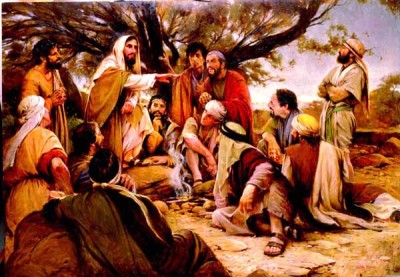 vs.3 He climbed the hillside, and sat down there with his disciples.
vs.3 He climbed the hillside, and sat down there with his disciples.
vs.4 It was shortly before the Jewish feast of the Passover.
vs.5 Looking up, Jesus saw the crowds approaching and said to Philip,
“Where can we buy some bread for these people to eat?”
vs.6 He only said this to test Philip; he himself knew exactly what he was going to do.
vs.7 Philip answered,
“Two hundred denarii would only buy enough to give them a small piece each.”
vs.8 One of his disciples, Andrew, Simon Peter’s brother, said,
vs.9 “There is a small boy here with five barley loaves and two fish;
but what is that between so many?”
vs.10 Jesus said to them, “Make the people sit down.“
There was plenty of grass there, and as many as five thousand men sat down.
vs.11 Then Jesus took the loaves, gave thanks, and gave them out to all who were sitting ready; he then did the same with the fish, giving out as much as was wanted.
vs.12 When they had eaten enough he said to the disciples,
“Pick up the pieces left over, so that nothing gets wasted.”
vs.13 So they picked them up, and filled twelve hampers with scraps left over from the meal of five barley loaves.
vs.14 The people, seeing this sign that he had given, said,
“This really is the prophet who is to come into the world.”
vs.15 Jesus, who could see they were about to come and take him by force and
make him king, escaped back to the hills by himself.
*******************************************
We have four commentators available from whom you may wish to choose .
Michel DeVerteuil : Holy Ghost Priest and late director of the Centre of Biblical renewal Trinidad W.I..
Thomas O’Loughlin: Prof, of Historical Theology University of Nottingham NG7 2RD
Sean Goan: Studied scripture in Rome, Jerusalem and Chicago
Donal Neary SJ: Editor of The Sacred Heart Messenger and National Director of The Apostlship of Prayer.
****************************************
Michel DeVerteuil
Lectio Divina with the Sunday Gospels
www.columba.ie
Textual Comments
This famous chapter of John’s, which presents Jesus as the Bread of Life, starts with the story of the miraculous feeding of the people by Jesus. Take the story very slowly, watching how it unfolds and stopping at whatever point you find touches you.
It can be divided up into sections:
* Verses 1-3: The stage is set. Jesus takes up his position on the other side of the sea, sitting on the hillside with his disciples. He lets the people come to him of their own accord.
* Verses 10-12: The miracle of the feeding.
* Verse 13: The command to pick up the scraps, which has its own deep symbolism.
* Verses 14-15: The confrontation between Jesus and the people.
Right through the story you will find yourself identifying either with Jesus or with the people. Jesus is the great leader and teacher; the people are symbolic of ourselves being led to experience grace in a deep way, with the blessing that this implies and also the wrong responses that we easily fall into.
The dialogue between Jesus and the apostles is also very significant, and you may want to focus on that aspect of the story.
Prayer Reflection
Lord, we thank you for leading us to a deeper relationship with you:
* we joined a prayer group or a religious community;
* we gave up a relationship that had been harming us for many years;
* we returned to confession and the Eucharist after a long break.
It was a journey you led us on, as you led the people in the wilderness.
It began when we were impressed by the signs you gave in curing the sick;
several people we knew had turned to you and found new meaning to their lives.
For a time, we were just following, not sure where we would end up; others worried about how we would satisfy our needs, but you knew exactly what you were going to do.
Then came the great moment of grace: we felt that you had given us all the nourishment we wanted; in fact, we had enough to fill countless hampers with the leftovers. Thank you, Lord.
Lord, we pray for parents who see their children following Jesus into new places.
Naturally, they are concerned, worrying about where the children will get bread to eat, and how they will make a living, or raise their families, or enjoy their recreation.
But you are letting them feel this concern only to test them; you know exactly what you are going to do for the children.
Lord, often leaders don’t believe in their people.
They think the problem is finding money to buy bread for them,
and, of course, there is never enough even to give them a small piece each.
If only they would seek out the little people with five barley loaves and two fish,
take the loaves and give thanks and give them out to all who are sitting ready,
and then do the same with the fish, giving out as much as is wanted,
they would find that all would have enough
and they would even pick up leftover scraps to fill twelve hampers.
“One act is required, and that is all. For this one act pulls everything together and keeps everything in order. This one act is to stand with attention in your heart.“ … Theophane the Recluse
Lord, we thank you for our parents, teachers, those who have guided us.
They allowed us to come to them of our own free will, like Jesus sitting on the hillside with his disciples.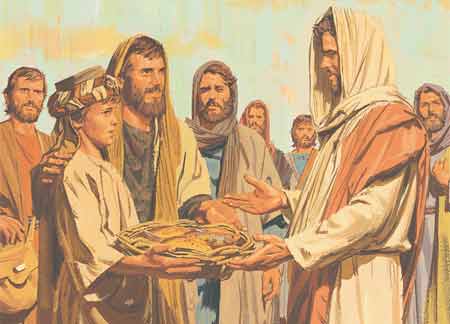
They tested us, as Jesus tested Philip when he knew exactly what he was going to do; and they waited for us to see the way forward, as Jesus waited for Andrew to point out the little boy with the five barley loaves and the two fish.
Lord, the sign that we receive food as a gift from you is that we pick up the pieces left over, so that nothing gets wasted. We thank you for those who taught us this deep truth.
“We have no vision, no models or metaphors to live by. Only the saints and mystics live well in a time like this.” …Denys Arcand, Canadian film director
Lord, when people impress us, we see the signs they have given and immediately we say,
“This is the prophet who is to come into the world,”
and we want to take them by force and make them king.
But they always escape from our grasp.
If we had experienced you, we would know that you are the only king
and we cannot possess you.
“One who knows his own weakness is greater than one who sees the angels.”
...Isaac of Nineveh, Syrian monk of the 7th century
Lord, it is so important that we who are in authority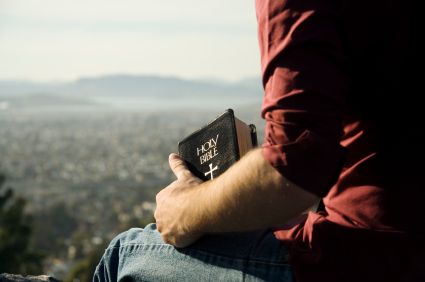
or have power over others should develop our inner life;
that, like Jesus, we should know how to leave people and go to the other side, and there climb a hillside to be alone with our companions.
Then we will have inner freedom
so that when people come to take us by force and make us what we cannot be
we will be able to escape back to the hills by ourselves.
*************************************
Thomas O’Loughlin
Liturgical Resources for the Year of Matthew
www.columba.ie
Introduction to the Celebration
We have assembled for our weekly Eucharist — as we do every week. But why is this important to us? And although we do it every week, how well do we as a community 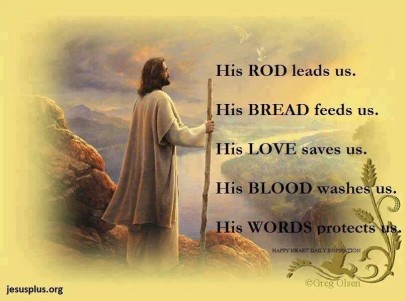 engage in this activity of celebrating the Eucharist?
engage in this activity of celebrating the Eucharist?
Giving thanks to the Father, in union with Jesus, while being empowered by the Spirit, is an activity: how well do we do this as the group of disciples who form a church here each Sunday?
These are important questions for us. So, over the next five weeks we are going to be reading passages from St John’s gospel on the Eucharist, and these will challenge us to reflect on what we are doing when we gather, why we are gathering for this meal, and how well we are celebrating it.
Let us reflect that we are gathered in the Holy Spirit, and about to celebrate the Lord’s meal, and with him offer thanks to the Father.
Homily Notes
1. Today is not a day for ‘giving‘ a homily, much less ‘preaching‘ — both assume an agent (the speaker) and an object (those who are spoken to). Rather, this is a day for trying to create a mood of just settling back and reflecting on what we are doing. What we are doing by gathering each Sunday, what we are doing when we celebrate the Eucharist, what we are doing as God’s People.
2. Suggestion:
One way to do this is to set the scene before reading the gospel. The scene can be set in this way (if the gospel is read by a deacon, then the president could set the scene; if the president himself has to read the gospel, then someone else could do it: it is better done while people are sitting down before the gospel acclamation):
We gather here each Sunday — this is the day when we recall the resurrection of Jesus; it is for us the first day of the week.
At this gathering we always recall something of our Lord’s life and teaching. This takes the form of reading a part of one of the four gospels — and today we are going to read from the gospel written by John.
Then we gather around the Lord’s table for the meal of the Lord, when we give thanks through Jesus to the Father over the gifts of bread and wine. Then by sharing those gifts we are transformed into the Body of Christ.
This is what Christians have done since the very beginning, and were doing this even before the gospels were written down.
Today we recall a story told by John at a gathering for the Eucharist on a Sunday over 2000 years ago. John knew that when the gathering heard the story it would help them understand the sacred dimension of the meal they celebrated together each week. We will now read that story.
3. Then when people have settled down again after the proclamation of the gospel, this reflection could be offered:
*Like the crowds we have gathered here to hear the message of Jesus.
*Like those crowds we have gathered here to be fed from his hands.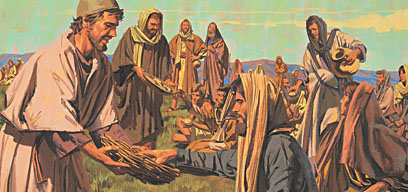
*Like on that hillside, Jesus takes our loaf, gives thanks to the Father, and gives it to all of us who are sitting around ready to be fed by him.
*Like on that hillside, we know that this food with which he feeds us is precious, and that it is the food for the whole world.
*Like those people who acclaimed him as ‘the prophet who is to come into the world’, we acclaim him as our priest, our prophet, and as our king – not a king whose kingdom belongs to this world, but as the king who presents the kingdom of truth and life to our Father in heaven.
**********************************
Sean Goan
Let the reader understand
www.columba.ie
Gospel
 For the next five Sundays we set aside our reading of the gospel of Mark to devote attention to John 6 and the Bread of Life discourse. The fourth gospel differs from the others in many respects and one is the way in which the evangelist teases out the implications of Jesus’ actions through long discussions in which the participants are being asked to consider in depth the symbolism behind his deeds.
For the next five Sundays we set aside our reading of the gospel of Mark to devote attention to John 6 and the Bread of Life discourse. The fourth gospel differs from the others in many respects and one is the way in which the evangelist teases out the implications of Jesus’ actions through long discussions in which the participants are being asked to consider in depth the symbolism behind his deeds.
The multiplication of the loaves and fishes is the only miracle story that John shares with the other gospels, though he calls them signs because of his desire to highlight not so much the power of Jesus but his identity. The signs point to who he is as the one sent by the Father. John’s account of this differs in some small ways. He tells us these events take place just before the feast of Passover and thereby invites us to make a connection with that founding story of the Israelites when God fed them in the wilderness. He also notes that the boy brings five ‘barley loaves’ which was the bread of the poor. Finally, we are told that twelve baskets of scraps are gathered up so that nothing may be lost. Here it is possible to see a symbolism referring to Jesus’ desire to gather to himself the new people of God.
Reflection
It is not given to us to perform miracles like Elisha and Jesus but perhaps that is as it should be. In a world where there is so much need, we have a great deal to give. It may not seem like much to us but when it is shared it becomes more than we can ever imagine. T he miracles worked by Jesus and Elisha needed someone to come along and offer what they had. God still needs us to do the same and still guarantees that if we do, things will happen! That we are reading from John over the next few weeks is an invitation to realise that while all the gospels proclaim Jesus, they do so differently. This means that we need to read them differently so that we can get the most from what the evangelist is trying to say. Very early on in the tradition of the church, John’s was called the ‘spiritual gospel’ because from the beginning it was recognised that he was challenging us to think very deeply about the mystery of the Word made flesh.
he miracles worked by Jesus and Elisha needed someone to come along and offer what they had. God still needs us to do the same and still guarantees that if we do, things will happen! That we are reading from John over the next few weeks is an invitation to realise that while all the gospels proclaim Jesus, they do so differently. This means that we need to read them differently so that we can get the most from what the evangelist is trying to say. Very early on in the tradition of the church, John’s was called the ‘spiritual gospel’ because from the beginning it was recognised that he was challenging us to think very deeply about the mystery of the Word made flesh.
Open Air Meal
Ordinary bread is a reminder of the Eucharist. Jesus feeds in the ordinary among the people. The fragments left over have been our bread ever since. From this gospel mystery we know we are always worthwhile in God’s eyes. Everyone is fed. We approach the bread of life not because we are saints, but because we need it.
We know also that our offering is worth it: 5 loaves and 2 fish of the poorest type. The leftovers on the shelf, the sardines only the poor ate: the boy had no idea of where his offering would lead. We never know where love will bear fruit.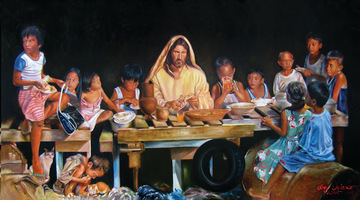
God is with us in the ordinary – the God of the table not just the temple. Where we are in life, he finds us, and feeds us most when we are most empty. We have often blocked good people from the table of God for too long.
He will feed us always – more than enough love in the heart of God for all. The meal of today has lasted, and the Eucharist is the central prayer and activity of the church. We minister the bread of life now to each other.
At Mass we meet the Lord Jesus, in his death and resurrection – each Mass is our entering into this mystery of prayer and love for the world. This is the active love of God, seen also in our service of his people.
As I eat bread this day, I might remind myself of the two breads
– bread of earth for the body and bread of heaven for the soul.
Lord, thank you for our daily bread.